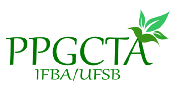Banca de QUALIFICAÇÃO: MELINA PASSOS SANTANA FERRAZ
Uma banca de QUALIFICAÇÃO de MESTRADO foi cadastrada pelo programa.DISCENTE : MELINA PASSOS SANTANA FERRAZ
DATA : 29/09/2021
HORA: 15:00
LOCAL: meet.google.com/qcs-sknk-nrv
TÍTULO:
Ethnobotanical study of medicinal plants in the Luiz Inácio Lula da Silva Settlement, Santa Cruz Cabrália/BA
PALAVRAS-CHAVES:
ethnobotany, medicinal plants, live pharmacy, herbal medicines, rural communities.
PÁGINAS: 85
GRANDE ÁREA: Outra
ÁREA: Ciências Ambientais
RESUMO:
In Brazil there is great biodiversity, especially of flora, and a considerable use of plants that stand out in popular knowledge. The use of plants for medicinal purposes is related to cultural habits and also the population's difficulty in accessing synthetic medicines, making medicinal plants sometimes the only option available for treatment. The Ministry of Health has introduced the use of medicinal plants in the policies and programs of the Unified Health System (SUS), encouraging traditional and complementary practices. In this perspective, the research aimed to present an overview of the use of medicinal plants with herbal potential in the Northeast of Brazil; and, carry out a survey of plants used by residents of the Luiz Inácio Lula da Silva Settlement (Lulão) in the municipality of Santa Cruz Cabrália/BA in order to understand how and why these people select and use medicinal plants in their daily lives and what are the implications of the use of plants for health. For this, bibliographic surveys were carried out and Ethnobotany methods were used. The research was approved by the Research Ethics Committee (CEP) of the Federal University of Southern Bahia (UFSB), and took place in two stages. Initially, a bibliographic survey was carried out with a focus on ethnobotanical studies carried out in the Brazilian Northeast. In the second stage, interviews were carried out at the Lulão Settlement by means of a phone call, or video call via cell phone, or even through face-to-face contact, depending on the respondent's availability and the conditions of social isolation in the face of the fight against COVID-19. The interviews were carried out using the sampling and selection technique called “snowball”. In the interview, when consented, the guided tour technique was also applied to collect plant samples, or the interviewee was asked to send photos of the plants for identification. The most cited native species in the literature survey and which do not have authorization for registration as herbal medicine are: Anacardium occidentale (caju), Amburana cearensis (imburana-de-chero), Anadenanthera colubrina (angico), Hymenaea courbaril (jatobá), Libidibia ferrea (ironwood), Mimosa tenuiflora (black jurema) and Ximenia americana (plum). Native species need incentives to continue research that analyze the effectiveness of therapeutic action. The plants that stand out for presenting the highest Use Value Index (VU) by the settlement community are: Pimpinella anisum (fennel), Aloe vera (aloe), Achillea millefolium (dipyrone), Mentha pulegium (pennyroyal), Plectranthus amboinicus (thick mint), Schinus terebinthifolia (aroeira), Amburana cearensis (imburana), Eugenia uniflora (pitanga), Bidens pilosa (needle-burr), Ocimum gratissimum (tioyo), Persea americana (avocado), Cajanus cajan (andu ), Senna alexandrina (sena), and Cymbopogon citratus (capim-santo). These species are used to treat various pathologies. The VU highlighted plants predominantly with herbaceous habits and botanical families generally cultivated near or in the backyards of homes. In addition, the interviews point to an appreciation of more abundant crop species, with a predominance of exotic and naturalized species (~65%). So far, the results seem to indicate that people select plants for use based on multiple simultaneous characteristics as proposed in the Use Value Hypothesis. The increased use of exotic/naturalized species may point to an erosion of local knowledge about plants native or the result of the proliferation of courses with exotic medicinal plants. so much It is important to highlight that flora is also an important tool for promoting health and for valuing traditional culture. It is expected that the results raised contribute to the knowledge about the species with herbal potential in the Northeast of Brazil and for the local Viva Pharmacy; subsidize the implementation of public policies aimed at environmental and cultural conservation in the region, as well as contribute to the sustainable use of the Atlantic Forest's natural heritage.
MEMBROS DA BANCA:
Presidente - 1553832 - JORGE ANTONIO SILVA COSTA
Interno - 1782304 - JAILSON SANTOS DE NOVAIS
Interna - 034.751.739-05 - CAROLINA WEBER KFFURI - UFSB
Externa ao Programa - 1716815 - GISELE LOPES DE OLIVEIRA



